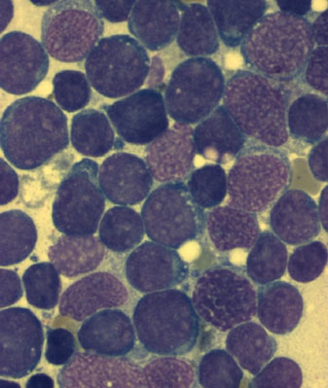FDA Approves Axatilimab in 9 Mg and 22 Mg Vial Sizes for GVHD
The developers expect the product to be available for order in the United States in early February 2025.
The developers expect the product to be available for order in the United States in early February 2025.

Axatilimab-csfr (Niktimvo), a CSF-1R–targeting agent that reduces the drivers of inflammation and fibrosis, has been approved by the FDA in 9 mg and 22 mg vial sizes to treat adult and pediatric patients with graft-versus-host disease (GVHD), according to a news release from the drug’s developers, Incyte and Syndax Pharmacueticals.1 Furthermore, the developers expect that the product will be available for order in the United States in early February 2025.
The FDA approved axatilimab for patients who weigh at least 40 kg with chronic GVHD after progression on at least 2 prior lines of systemic therapy in August 2024.2 Support for the approval was based on phase 2 AGAVE-201 trial (NCT04710576) data. Previous findings were presented at the 2023 American Society of Hematology (ASH) Annual Meeting.3
Findings revealed that the trial met its primary end point across all cohorts treated with axatilimab, with 74% (95% CI, 63%-83%) of patients receiving 0.3 mg/kg every 2 weeks attaining a response at 6 months of treatment. Additionally, 67% (95% CI, 55%-77%) of patients receiving 1.0 mg/kg of axatilimab every 2 weeks and 50% (95% CI, 39%-61%) of those receiving 3.0 mg/kg every 4 weeks achieved a response.
"We are thrilled to build on our strong commitment to the GVHD community with the US launch of [axatilimab], a first-in-class therapeutic agent that has demonstrated remarkable responses in patients with chronic GVHD whose response was suboptimal after at least 2 prior lines of systemic therapy," Hervé Hoppenot, chief executive officer of Incyte, said in the news release.1 "Our deep understanding of chronic GVHD and our connections in the clinical community will support a successful launch, in partnership with Syndax, of this important medicine for patients."
In the open-label, randomized study, patients who experienced an immune-mediated complication of allogenic hematopoietic cell transplant and had recurrent or refractory GVHD were randomly assigned (1:1:1) to receive axatilimab at 3 dose levels. Dose level 1 consisted of intravenous axatilimab at 0.3 mg/kg every 2 weeks, dose level 2 consisted of 1 mg/kg every 2 weeks, and dose level 3 consisted of 3 mg/kg every 4 weeks.
A total of 239 of 241 patients (99.2%) were treated with at least 1 axatilimab dose as of the data cutoff date of April 7, 2023. Patients were pretreated with a median of 4 prior lines of systemic therapy, with 74%, 23%, and 31% previously receiving ruxolitinib (Jakafi), belumosudil (Rezurock), and ibrutinib (Imbruvica), respectively. Additionally, randomization was stratified by GVHD severity and prior therapy use, with demographics and disease characteristics balanced across all 3 cohorts.
The primary end point of the trial was overall response rate (ORR) in the first 6 cycles or 24 weeks of treatment. Secondary end points included reductions in modified Lee Symptom Scale (mLSS) scores, duration of response (DOR), and safety.4
The median DOR was not reached in any of the 3 cohorts, with 60% of the 0.3 mg/kg group, 60% of the 1 mg/kg group, and 53% of the 3 mg/kg group maintaining responses at 12 months. Additionally, clinical benefit was observed in 55%, 54%, and 36% of each respective group.
Drug discontinuation related to treatment-emergent adverse events (TEAEs) occurred in 6% of the dose level 1 group, 22% of the dose level 2 group, and 18% of the dose level 3 group. Additionally, fatal TEAEs occurred in 1.3%, 8.6%, and 7.6% of each group, respectively.
References
- Incyte and Syndax announce U.S. Food and Drug Administration (FDA) approval of Niktimvo™ (axatilimab-csfr) 9 mg and 22 mg vial sizes. News release. Incyte. January 15, 2025. Accessed January 15, 2025. https://tinyurl.com/bdkbh6md
- FDA approves axatilimab-csfr for chronic graft-versus-host disease. News release. FDA. August 14, 2024. Accessed January 15, 2025. https://shorturl.at/Iqnno
- Wolff D, Cutler C, Lee SJ, et al. Safety and efficacy of axatilimab at 3 different doses in patients with chronic graft-versus-host disease (AGAVE-201). Blood. 2023;142(suppl 1):1. doi:10.1182/blood-2023-186963
- A study of axatilimab at 3 different doses in participants with chronic graft versus host disease (cGVHD) (AGAVE-201). ClinicalTrials.gov. Updated October 10, 2024. Accessed January 15, 2025. https://tinyurl.com/bdzsvrev
Navigating AE Management for Cellular Therapy Across Hematologic Cancers
A panel of clinical pharmacists discussed strategies for mitigating toxicities across different multiple myeloma, lymphoma, and leukemia populations.